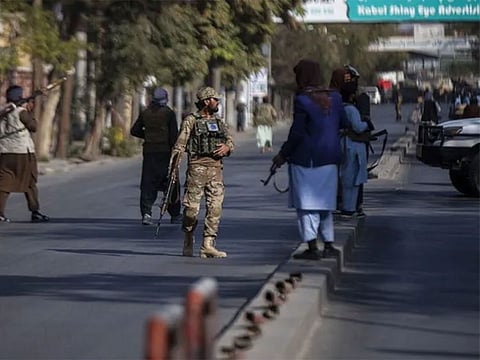Afghanistan must be pulled back from the brink
World has a moral reason to avert catastrophic mass starvation in Taliban-ruled country

We are letting people die in Afghanistan. All innocent people. Men, women and children.
Letting people die is considered — and if it’s not, it should be — a crime equal in its egregiousness to killing them outright.
At first blush, it may seem ludicrous to suggest that those of us who, for whatever reason, turn a blind eye and a deaf ear to appeals for help by a people dying of starvation are complicit in murder.
But it really is not when it becomes apparent, at the end of the day, that we could not plausibly draw a distinction between allowing a people to be bombed to death and allowing them to starve to death. I say there’s nothing worked into our moral system that warrants such a distinction.
Facing economic collapse, social turmoil and, above all, widespread starvation across large swaths of the country, with roughly 22 million of its citizens — more than half the population — expected to endure threatening food-insecurity this winter, Afghanistan today is a classic, albeit tragic, case study of a nation on the edge, ill prepared to deal with looming catastrophe.
The less said about the $2.3 trillion the US spent in Afghanistan, which amounts to $300 million a day over the two decades Americans were there, the better. Let’s just say wars rarely go as planned and policymakers in Washington, unschooled as they were in the enigmatic culture of that faraway land, found the task of nation-building there way too Herculean, not to mention way too back-breaking.
A looming catastrophe
The reason for the looming catastrophe in Afghanistan is well-known: The country no longer has access to the billions of dollars from Western donor countries that had propped up the previous US-backed government, and the sanctions imposed on the current Taliban-led government have isolated Afghans from the global financial system, paralysing not only Afghan banks but the ability of humanitarian groups to provide aid.
Moreover, the sanctions have, virtually overnight, resulted in mass layoffs of workers in both the government and the private sector. And those still employed have reportedly gone months without receiving pay.
You want to know how dire the situation is, then here’s a quote from a news report filed from rural Afghanistan on Monday by New York Times correspondent Christine Goldbaum: “Across the country, millions of Afghans are without steady income. The prices of food have soared beyond the reach of many families. Emaciated children and anaemic mothers have flooded into malnutrition wards of hospitals, with many of these facilities bereft of medical supplies that donor aid once provided”
The reporter then goes on to tell us in her lengthy article of how these woes are compounded by a drought, which is — hold on to your hat — the worst the nation has had in a decade and which has already levelled once lush lands, starved farm animals and dried irrigation channels. In rural areas, where 70 per cent of the population lives, many farmers have effectively given up on farming.
Describing these dire conditions in a district in Kandahar called Shah Wali Kot, Goldbaum wrote: “For decades, small farmers survived the winter on stored wheat from their summer harvest and the income from selling onions in the market. But this year yielded barely enough to sustain families during the fall months”.
Look, according to an analysis by the United Nations Food Program, there are in Afghanistan, as we speak, 8.7 million people nearing famine. As the freezing winter weather sets in soon, expect that countless men, women and children will face potential death. And without food in their pantries, what other fate would you guess awaits these simple folks?
And these simple folks don’t know sanctions from a hole in the wall. But they do know — and the despair that comes with the knowing eats at their hearts — what the sound of a baby crying for food means.
The United States, along with its European allies, may not have a political reason for legitimising the Taliban by lifting the sanctions, but they have a moral reason to cut a deal with the group in order to avert catastrophic mass starvation in Afghanistan. Moral imperative surely should trump political consideration.
I say if the cost of sanctions, imposed on the Taliban government to deny it legitimacy, translates into unspeakable suffering, destitution and ultimately the death of countless innocent souls, then sanctions be damned.
— Fawaz Turki is a journalist, academic and author based in Washington. He is the author of The Disinherited: Journal of a Palestinian Exile





